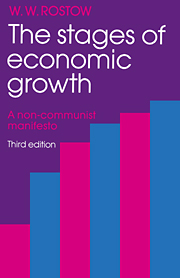Book contents
- Frontmatter
- Contents
- Preface to the Third Edition
- Preface to the Second Edition
- Preface to the First Edition
- 1 INTRODUCTION
- 2 THE FIVE STAGES-OF-GROWTH—A SUMMARY
- 3 THE PRECONDITIONS FOR TAKE-OFF
- 4 THE TAKE-OFF
- 5 THE DRIVE TO MATURITY
- 6 THE AGE OF HIGH MASS-CONSUMPTION
- 7 RUSSIAN AND AMERICAN GROWTH
- 8 RELATIVE STAGES-OF-GROWTH AND AGGRESSION
- 9 THE RELATIVE STAGES-OF-GROWTH AND THE PROBLEM OF PEACE
- 10 MARXISM, COMMUNISM, AND THE STAGES-OF-GROWTH
- Appendix A THE DIFFUSION OF THE PRIVATE AUTOMOBILE
- Appendix B THE CRITICS AND THE EVIDENCE
- Coda: REFLECTIONS ON THE DEBATE AS OF 1990
- Acknowledgments
- Index
10 - MARXISM, COMMUNISM, AND THE STAGES-OF-GROWTH
Published online by Cambridge University Press: 05 June 2012
- Frontmatter
- Contents
- Preface to the Third Edition
- Preface to the Second Edition
- Preface to the First Edition
- 1 INTRODUCTION
- 2 THE FIVE STAGES-OF-GROWTH—A SUMMARY
- 3 THE PRECONDITIONS FOR TAKE-OFF
- 4 THE TAKE-OFF
- 5 THE DRIVE TO MATURITY
- 6 THE AGE OF HIGH MASS-CONSUMPTION
- 7 RUSSIAN AND AMERICAN GROWTH
- 8 RELATIVE STAGES-OF-GROWTH AND AGGRESSION
- 9 THE RELATIVE STAGES-OF-GROWTH AND THE PROBLEM OF PEACE
- 10 MARXISM, COMMUNISM, AND THE STAGES-OF-GROWTH
- Appendix A THE DIFFUSION OF THE PRIVATE AUTOMOBILE
- Appendix B THE CRITICS AND THE EVIDENCE
- Coda: REFLECTIONS ON THE DEBATE AS OF 1990
- Acknowledgments
- Index
Summary
This final chapter considers how the stages-of-growth analysis compares with Marxism; for, in its essence, Marxism is also a theory of how traditional societies came to build compound interest into their structures by learning the tricks of modern industrial technology; and of the stages that will follow until they reach that ultimate stage of affluence which, in Marx's view, was not Socialism, under the dictatorship of the proletariat, but true Communism. As against our stages—the traditional society; the preconditions; take-off; maturity; and high mass-consumption—we are setting, then, Marx's feudalism; bourgeois capitalism; Socialism; and Communism.
We shall proceed by first summarizing the essence of Marx's propositions. We shall then note the similarities between his analysis and the stages-of-growth; and the differences between the two systems of thought, stage by stage. This will provide a way of defining the status and meaning of Marxism, as seen from the perspective of the stages-of-growth sequence. Finally, we shall look briefly at the evolution of Marxist thought and Communist policy, from Lenin forward; and draw some conclusions.
THE SEVEN MARXIST PROPOSITIONS
Marxist thought can be summarized in seven propositions, as follows.
First, the political, social and cultural characteristics of societies are a function of how the economic process is conducted. And, basically, the political, social and cultural behaviour of men is a function of their economic interests. All that follows in Marx derives from this proposition until the stage of Communism is reached, when the burden of scarcity is to be lifted from men and their other more humane motives and aspirations come to dominance.
- Type
- Chapter
- Information
- The Stages of Economic GrowthA Non-Communist Manifesto, pp. 145 - 167Publisher: Cambridge University PressPrint publication year: 1991
- 1
- Cited by



